Seagate's Momentus XT Reviewed, Finally a Good Hybrid HDD
by Anand Lal Shimpi on May 24, 2010 9:31 AM EST- Posted in
- Storage
- SSDs
- Seagate
- Momentus XT
- Hybrid Drive
- SSHDs
Overall System Performance using PCMark Vantage
Next up is PCMark Vantage, another system-wide performance suite. For those of you who aren’t familiar with PCMark Vantage, it ends up being the most real-world-like hard drive test I can come up with. It runs things like application launches, file searches, web browsing, contacts searching, video playback, photo editing and other completely mundane but real-world tasks. I’ve described the benchmark in great detail before but if you’d like to read up on what it does in particular, take a look at Futuremark’s whitepaper on the benchmark; it’s not perfect, but it’s good enough to be a member of a comprehensive storage benchmark suite. Any performance impacts here would most likely be reflected in the real world.
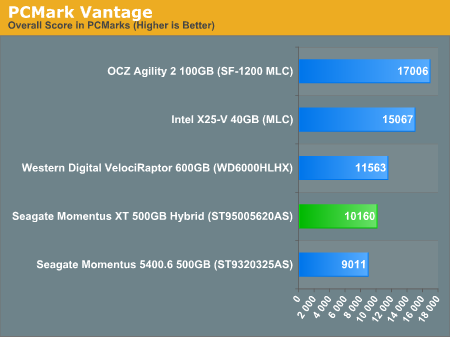
The PCMark Vantage Suite puts the Momentus XT smack in the middle of the 5400.6 and the VelociRaptor. The individual suites generally tell a similar story, although in some cases the drive actually outperforms the VelociRaptor.
The memories suite includes a test involving importing pictures into Windows Photo Gallery and editing them, a fairly benign task that easily falls into the category of being very influenced by disk performance.
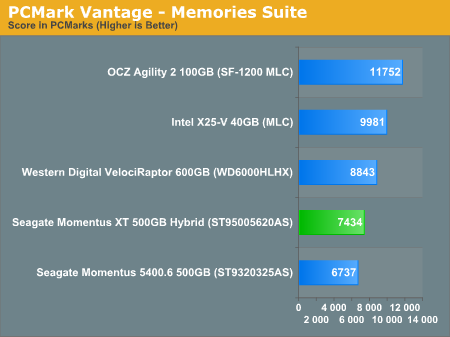
The TV and Movies tests focus on on video transcoding which is mostly CPU bound, but one of the tests involves Windows Media Center which tends to be disk bound.
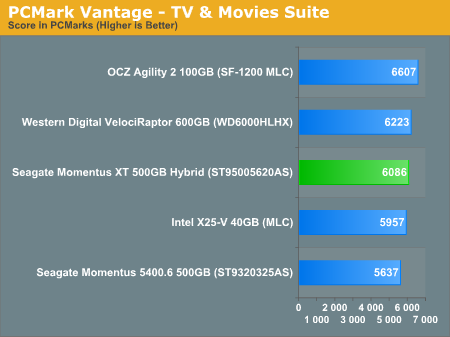
The gaming tests are very well suited to SSDs since they spend a good portion of their time focusing on reading textures and loading level data. All of the SSDs dominate here, but as you'll see later on in my gaming tests the benefits of an SSD really vary depending on the game. Take these results as a best case scenario of what can happen, not the norm.
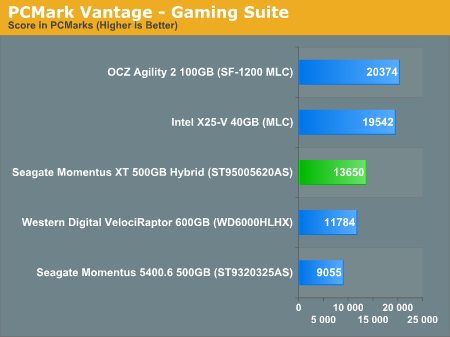
In the Music suite the main test is a multitasking scenario: the test simulates surfing the web in IE7, transcoding an audio file and adding music to Windows Media Player (the most disk intensive portion of the test).

The Communications suite is made up of two tests, both involving light multitasking. The first test simulates data encryption/decryption while running message rules in Windows Mail. The second test simulates web surfing (including opening/closing tabs) in IE7, data decryption and running Windows Defender.
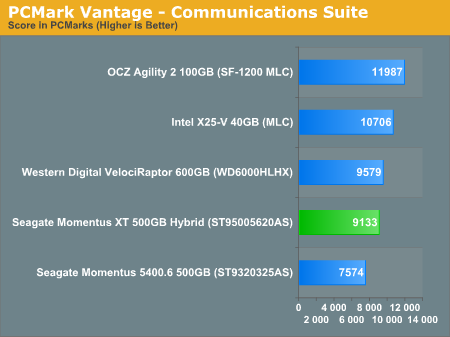
I love PCMark's Productivity test; in this test there are four tasks going on at once, searching through Windows contacts, searching through Windows Mail, browsing multiple webpages in IE7 and loading applications. This is as real world of a scenario as you get and it happens to be representative of one of the most frustrating HDD usage models - trying to do multiple things at once. There's nothing more annoying than trying to launch a simple application while you're doing other things in the background and have the load take forever.
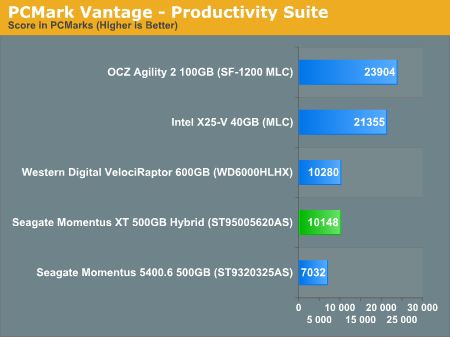
The final PCMark Vantage suite is HDD specific and this is where you'll see the biggest differences between the drives:
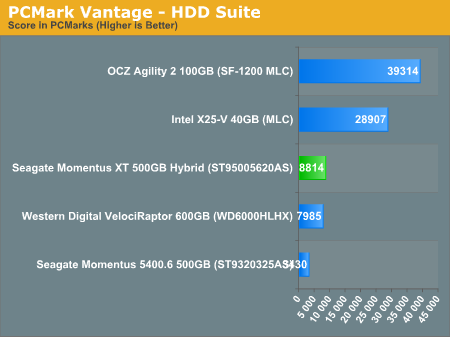










120 Comments
View All Comments
leexgx - Monday, May 24, 2010 - link
vista and windows 7 make an cache file so when it boots up it loads it into ram so when the programs request it its all ready in ram, it norm frees up approx 400MB on my system once the desktop has shown for more then 20-30 secsthe above can only be done after the first boot has happened (so second and 3rd boot are norm better as it now has history and this fie is remade every boot so the flash is likely not been used as its an new file every boot up as it tweeks it every boot)
superfetch and this preboot in windows 7 would of messed some of these results up an little
DominionSeraph - Monday, May 24, 2010 - link
Sounds more like Windows' boot optimization to me. If that's still an idle task in Windows 7, perhaps the 5400RPM drive isn't being allowed to idle long enough to process the boot defrag?jimhsu - Monday, May 24, 2010 - link
I've said that the future usage scenario of SSDs, barring any dramatic price decreases, will probably be as cache. (For example, ZFS: http://iablog.sybase.com/paulley/2008/08/flash-ssd... and I'm pretty certain the other big file systems such as NTFS and ext will follow). And http://arstechnica.com/civis/viewtopic.php?f=15&am... . Do such "hybrid drives" offer better performance, better reliability, or any other advantage over filesystem-level caching techniques?nortexoid - Monday, May 24, 2010 - link
There's not much point in the synthetic benchmarks besides showing how the drive performs on applications that you're not running frequently--i.e. to compare the hdd-minus-the-4gb-flash-cache performance of the drive, basically.I'd say these hybrid drives are the best of both worlds and hence the best drives currently on the market. Capacity plus speed at "little" more than a standard magnetic drive. Awesome
KingofL337 - Monday, May 24, 2010 - link
I really wish they could have used 8-16GB of FLASH. 4GB isn't enough to really speed up everything you use allot on your computer to SSD speeds. I think for most people 8-16GB could definitely nail down the common stuff.What would be really sweet is if some company would make a hybrid drive controller that could take a SSD and HDD, then slave them together and make a hybrid system. Then I could select the size SSD and HDD based on my performance requirements.
Shadowmaster625 - Monday, May 24, 2010 - link
Seagate can only do what makes them money. If they sell a lot of these then the design team will be allowed to continue improving and exploring additional options. If they dont sell well, well...What I want is a flash cache that stores all my 4K random writes in flash, and also stores in flash any 4K cluster that I access frequently. 16GB 4 channel MLC would cost about the same as 1 channel of 4GB SLC. But they would need to add wear leveling.
leexgx - Monday, May 24, 2010 - link
the idea of the drive is so that the Most common read LBA blocks on the disk get cached into the flash, the drive does not care if the Read was an file or not as its only looking at what Part of the disk was read the most and puts that onto the flashquite an good idea really
arthur449 - Monday, May 24, 2010 - link
Silverstone has been selling a SSD+HDD device like you describe.http://silverstonetek.com/products/p_contents.php?...
It would be interesting to see how this SSD/HDD "do-it-yourself" hybrid fairs against The Mighty Anandtech Storage Benchmark, and, if pairing a fast SSD with a fast HDD, would give us a truly seamless best of both worlds experience.
shin0bi272 - Monday, May 24, 2010 - link
If you have a velociraptor dont bother with this and buy a standard SSD to boot from.piroroadkill - Monday, May 24, 2010 - link
You'll be announcing the Barracuda's with this, say, 2TB, with 8-16GB cache, anytime soon, right?